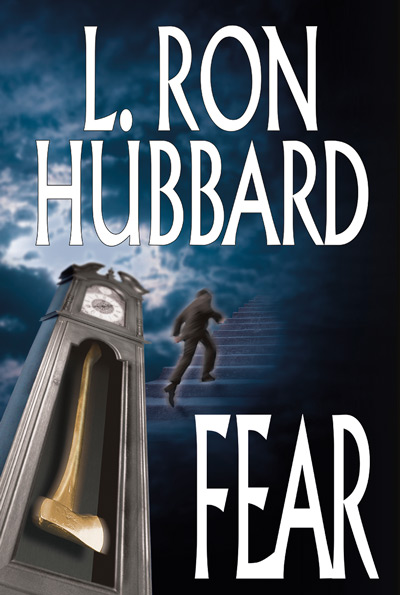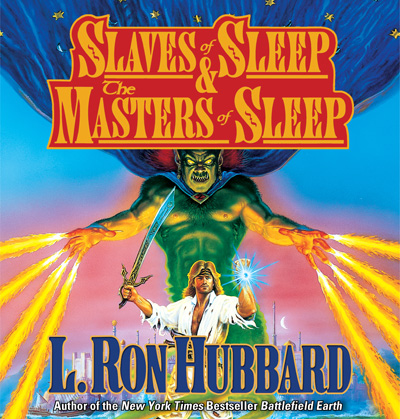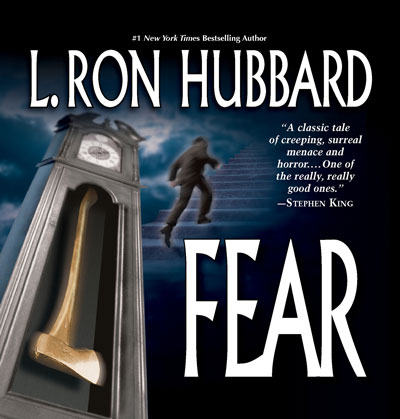A novel of compelling suspense.
Professor James Lowry didn’t believe in spirits, or witches, or demons.
Not until a gentle spring evening when his hat disappeared, and suddenly he couldn’t remember the last four hours of his life. Now, the quiet university town of Atworthy is changing—slightly at first, then faster and more frighteningly each time he tries to remember.
Lowry is pursued by a dark, secret evil that is turning his whole world against him while it whispers a warning from the shadows: If you find your hat you’ll find your four hours. If you find your four hours then you will die.…
“A classic tale of creeping, surreal menace and horror … one of the really, really good ones.” —Stephen King
ABOUT THE AUTHOR
L. Ron Hubbard began work on Fear in January 1940. His customary practice was to visualize a story completely and then to sit down and write it, straight through, with whirlwind speed. But by his own account, Fear came more slowly. “I finally got the plot of it licked,” he wrote to a friend, describing his realized conception of the main character who unexpectedly loses hours from his life.
“He strives to locate his deeds while missing everywhere but in the right place, for he fears to look there,” the author explained. As for style, Ron Hubbard added: “And I think a nice, delicate style is best suited. Paint everything in sweetness and light and then begin to dampen it, not with the style, but with the events themselves.”
In the preceding issue of Unknown, John Campbell had warned his readers not to miss Hubbard’s story. “Fear,” he said, “has been built of nightmare stuff.”
It was. It is. And its impact was immediate, genre-shaping, and permanent. Literary historian David Hartwell has applauded it as “one of the foundations of the contemporary horror genre, widely influential, and powerfully effective. From Ray Bradbury to Stephen King, a literary debt is owed to L. Ron Hubbard for Fear.”
Chapter One
Lurking, that lovely spring day, in the office of Dr. Chalmers, Atworthy College Medical Clinic, there might have been two small spirits of the air, pressed back into the dark shadow behind the door, avoiding as far as possible the warm sunlight which fell gently upon the rug.
Professor Lowry, buttoning his shirt, said, “So I am good for another year, am I?”
“For another thirty-eight years,” smiled Dr. Chalmers. “A fellow with a rugged build like yours doesn’t have to worry much about a thing like malaria. Not even the best variety of bug Yucatán could offer. You’ll have a few chills, of course, but nothing to worry about. By the way, when are you going back to Mexico?”
“If I go when my wife gives me leave, that’ll be never.”
“And if I had a woman as lovely as your wife, Mary,” said Chalmers, “Yucatán could go give its malaria to somebody else. Oh, well”—and he tried to make himself believe he was not, after all, envious of Atworthy’s wandering ethnologist—“I never could see what you fellows saw in strange lands and places.”
“Facts,” said Lowry.
“Yes, I suppose. Facts about primitive sacrifice and demons and devils— Say, by the way, that was a very nice article you had in the Newspaper Weekly last Sunday.”
The door moved slightly, though it might have been caused by the cool breath of verdure which came in the window.
“Thank you,” said Lowry, trying not to look too pleased.
“Of course,” said young Chalmers, “you were rather sticking out your neck. You had your friend Tommy frothing about such insolence. He’s very fond of his demons and devils, you know.”
“He likes to pose,” said Lowry. “But how do you mean, ‘sticking out my neck’?”
“You haven’t been here much under Jebson,” said Chalmers. “He nearly crucified a young mathematician for using Atworthy’s name in a scientific magazine. But then, maybe our beloved president didn’t see it. Can’t imagine the old stuffed shirt reading the Newspaper Weekly, anyway.”
“Oh,” said Lowry. “I thought you meant about my denying the existence of such things. Tommy—”
“Well, maybe I meant that, too,” said Chalmers. “I guess we’re all superstitious savages at heart. And when you come out in boldface type and ridicule ancient belief that demons caused sickness and woe and when you throw dirt, so to speak, in the faces of luck and fate, you must be very, very sure of yourself.”
“Why shouldn’t I be sure of myself?” said Lowry, smiling. “Did anyone ever meet a spirit of any sort face to face? I mean, of course, that there aren’t any authenticated cases on record anywhere.”
“Not even,” said Chalmers, “the visions of saints?”
“Anyone who starves himself long enough can see visions.”
“Still,” said Chalmers, “when you offer so wildly to present your head in a basket to the man who can show you a sure-enough demon—”
“And my head in a basket he shall have,” said Lowry. “For a man of science, you talk very weirdly, old fellow.”
“I have been in a psychiatric ward often enough,” said Chalmers. “At first I used to think it was the patient and then, after a while, I began to wonder. You know, demons are supposed to come out with the full moon. Ever watch a whole psychopathic ward go stark raving mad during the three days that a moon is full?”
“Nonsense.”
“Perhaps.”
“Chalmers, I tried, in that article, to show how people began to believe in supernatural agencies and how scientific explanation has at last superseded vague terror. Now don’t come along and tell me that you can cast some doubt on those findings.”
“Oh”—and Chalmers began to laugh—“we both know that ‘truth’ is an abstract quantity that probably doesn’t exist. Go crusading against your devils and your demons, Professor Lowry. And if they get mad at you, argue them out of existence. I myself don’t say they exist. It merely strikes me strangely that man’s lot could be so consistently unhappy without something somewhere aiding in that misery. And if it is because electrons vibrate at certain speeds, or if it is because the spirits of air and earth and water are jealous of any comfort and happiness that man might have, I neither know nor care. But how comforting it is to knock on wood when one has made a brag.”
“And so,” said Lowry, slipping into his topcoat, “the goblins are gonna get me if I don’t watch out.”
“They’ll get you all right if Jebson saw that article,” said Chalmers.
The door moved ever so little—but then, perhaps it was just the cool, sweet breath of spring whispering through the window.
Fear Glossary
ague: a fever with alternating periods of chills and sweating.
Alas, poor Lowry. I knew him, Horatio: a reference to a line in the Shakespeare play, Hamlet. Hamlet says to his friend Horatio while holding the skull of Yorick, the dead court jester: “Alas, poor Yorick! I knew him, Horatio.”
auto-da-fé: an execution of a heretic by the Spanish Inquisition, especially by burning them at the stake. Auto-da-fé is Portuguese for “act of faith.”
bagatelle: something unimportant and easy to do.
box: the raised seat on a horse-drawn coach where the driver sits.
Brummell, Beau: an English gentleman (1778–1840) who had a reputation for fashion, wit and was a regular attendee at social gatherings.
buccaneer: a pirate, especially one who fought and preyed on Spanish ships in the West Indies during the seventeenth century. The word buccaneer comes from the French word boucanier, a French trader on the islands of Hispaniola and Tortuga who hunted the island’s wild cattle and boars for their hides, smoking the meat in a barbecue frame known in French as a boucan. Conflict with Spanish forces drove them off the islands and forced them into piracy against the Spanish.
cabalistic: about secret or mystical beliefs.
Carroll: Lewis Carroll (1832–1898), an English author whose most famous writings are Alice’s Adventures in Wonderland and Through the Looking-Glass.
cashier: to dismiss someone from a position of command for disciplinary reasons.
Cicero: Marcus Tullius Cicero (106–43 BC), a Roman statesman, lawyer, political theorist and philosopher.
Colt .38: a .38 inch-caliber automatic pistol manufactured by the Colt Firearms Company of Hartford, Connecticut.
constable: a police officer of the lowest rank.
devil, to: to tease or make fun of someone.
don: a Spanish gentleman.
Drake: Sir Francis Drake (1540–1596), an English sea captain, slave trader, naval officer and explorer.
Dumas: Alexandre Dumas (1802–1870), a French writer best known for his swashbuckling historical tales including The Count of Monte Cristo and The Three Musketeers.
ennui: weariness resulting from inactivity or lack of interest; boredom.
Erin: an ancient name for Ireland.
Fates: in classical mythology, the three goddesses Clotho, Lachesis and Atropos, who control the destiny of humans.
flagship: a ship where the commander of the fleet lives.
Gibbon: Edward Gibbon (1737–1794), an English historian best known for his work The History of the Decline and Fall of the Roman Empire.
Greenwich Village: a residential section of lower Manhattan, New York City. It is famous as a gathering place for writers and artists.
heard tell: was told that.
Homer: (eighth century BC), a Greek epic poet who is believed to be the author of two of the greatest works in Western literature, The Iliad and The Odyssey.
Horatio: See Alas, poor Lowry. I knew him, Horatio.
Ingraham, Colonel: Colonel Prentiss Ingraham (1843–1904), a prolific American fiction author, best known for his Buffalo Bill series.
Ketch, Jack: an English executioner in the 1600s, notorious for the barbarous and sadistic techniques he employed. His victims were known to have suffered unnecessarily at their deaths due to his brutal and inept manner.
Khayyám: Omar Khayyám (1048–1131), Persian mathematician, astronomer and poet. His most well-known poetry is the collection translated by English writer Edward FitzGerald entitled The Rubáiyát of Omar Khayyám.
lord high admiral: the commander of a naval fleet.
Machiavellian: cunning, deceitful and dishonest. The word Machiavellian comes from the name of the Renaissance diplomat and writer Niccolò Machiavelli (1469–1527) who described how to acquire and maintain political power in his work, The Prince.
Medusa: in Greek mythology, a monster with the face of a hideous woman with live venomous snakes for hair. Anyone who looked at her directly turned to stone.
merchant prince: a very wealthy or influential merchant.
mother: used to address an elderly woman with affectionate respect.
New World: North America, Central America and South America; the Americas.
old top: used to address a male friend or acquaintance.
old wives’ tale: a superstitious belief or legend not based on fact.
Parisian wit: a sense of humor that always finds something to laugh about, no matter how tragic a circumstance may be.
pince-nez: a pair of glasses held on the face by a spring that pinches the nose. Pince-nez is French for “pinch the nose.”
ride to hounds: to ride behind the hounds in a fox hunt.
rondure: a rounded or curved part of something.
Shakespeare: William Shakespeare (1564–1616), English playwright and poet. His works include Hamlet, Romeo and Juliet, Othello and other plays and poetry.
shilly-shally: act in an uncertain or hesitant manner.
siphon: short for soda siphon, a glass bottle with a tube for dispensing soda water.
sola topi: a pith helmet, a sun hat made from the stems of a sola plant. Topi is Hindi for hat.
strain: part of a family that combines the characteristics of a certain line of ancestors.
sup: to eat or drink something.
Swift: Jonathan Swift (1667–1745), an Anglo-Irish satirist, essayist and poet, whose works include Gulliver’s Travels.
Tennyson: Alfred Tennyson (1809–1892), a British poet whose poems include “The Charge of the Light Brigade” and “The Lady of Shalott.”
throw dirt: be disrespectful toward someone or something.
Verne: Jules Verne (1828–1905), a French author who pioneered the science fiction genre writing novels such as A Journey to the Centre of the Earth and Twenty Thousand Leagues Under the Sea.
whatnot stand: a stand with shelves, used for displaying ornaments, etc.
Yucatán: a peninsula in southeastern Mexico between the Caribbean Sea and the Gulf of Mexico.











